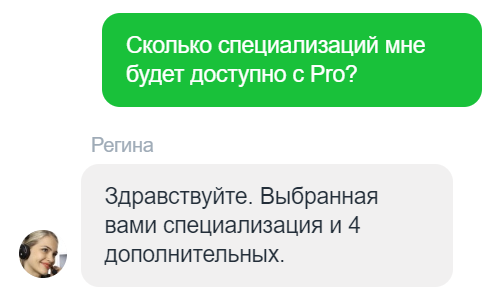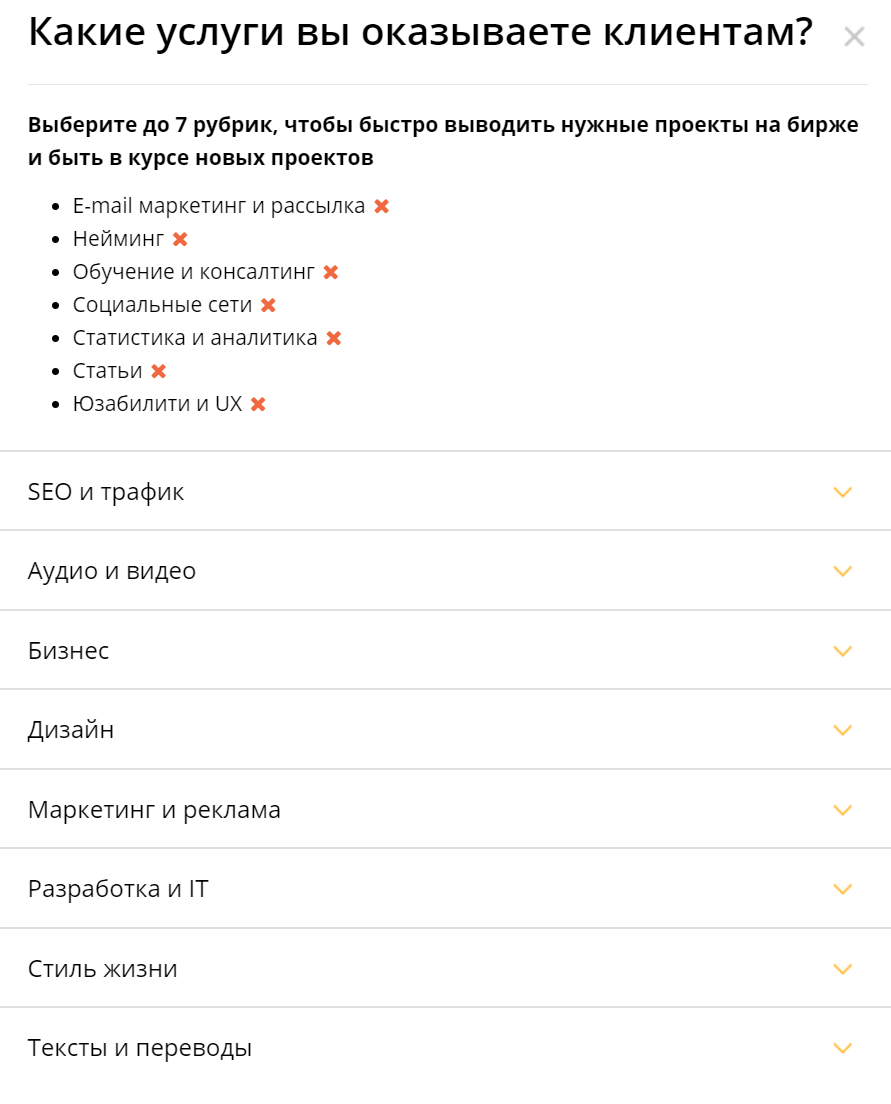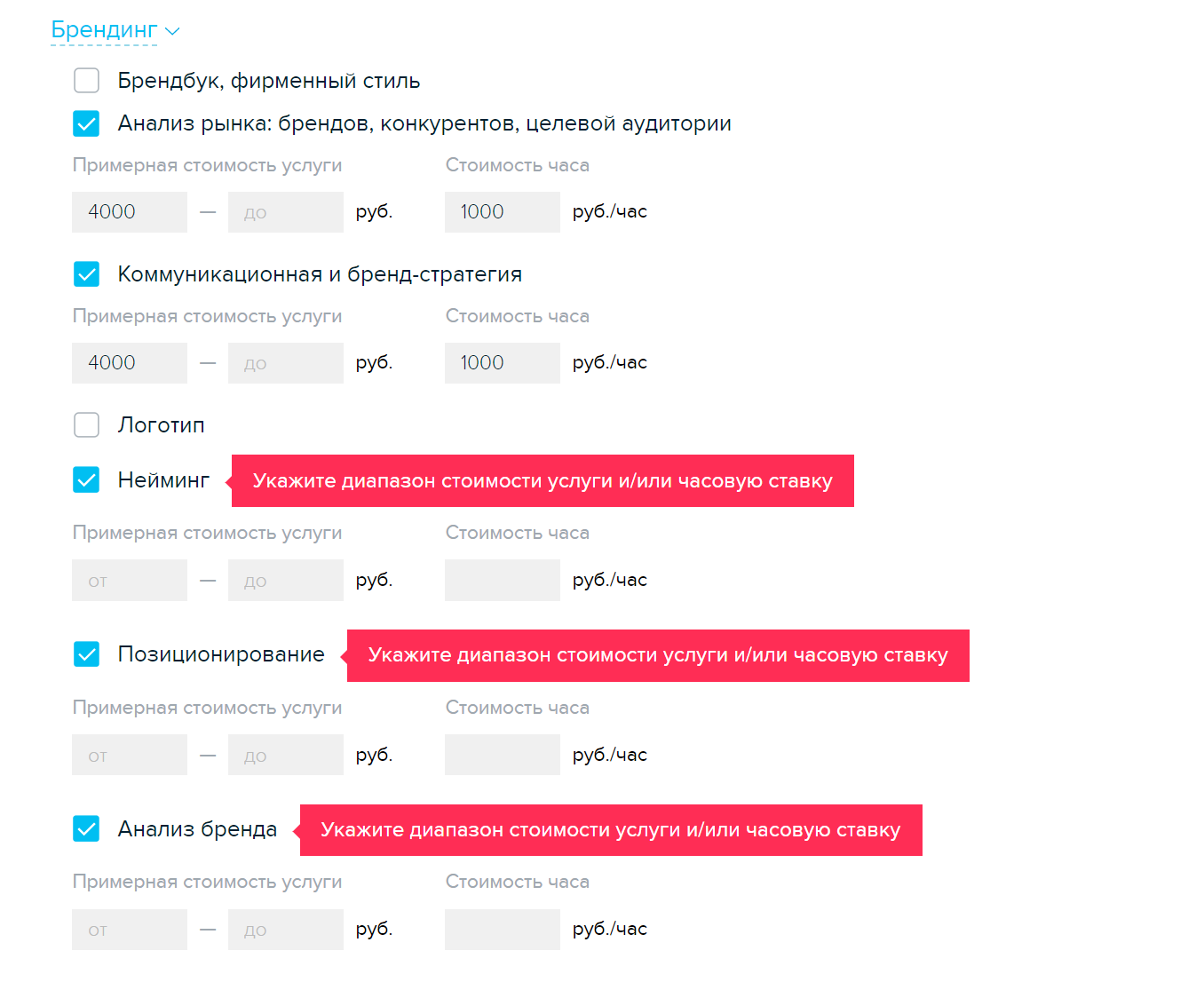Freelance Watchmen
People who designed specialization settings for freelancers on other resources clearly have some idea of reality, in which each freelancer is a robot programmed from the cradle to perform a specific type of work in a strictly defined range of tasks according to the principle "Can you count? You will be an accountant. ” And these people are not joking in their desire to impose their ideas on reality itself. A simple example: on fl.ru there are more than two hundred specializations, divided into 20 categories - of which one is free for freelancers (!), And when you buy a Pro account that costs from one and a half thousand rubles a month - as many as five.

Five of more than two hundred specializations. Purchasing a Pro account for some of which costs more than two and a half thousand rubles a month . For five specializations from two hundred.
It seems that fl.ru developers have never met people who are able to do more than five things in their life. Years pass, domains become shorter, and freelance.ru remains freelance.ru .
There is no specialization of the user profile on kwork.ru as such, but there is an exchange of projects sorted by 69 categories, from which any seven can choose.

Why exactly seven? Why not six? Why not eight? Why not sixty eight? Where and why is this restriction in seven sections that a freelancer can choose by customizing the project feed to fit his needs? Perhaps Quark has extremely superstitious people who believe that number seven brings good luck? And this is the most logical of all the possible explanations that came to my mind.
Of course, these are rhetorical questions and the answer to them is well known to me - it’s just not from the field of usability, but from the field of psychology: the watchman’s syndrome.
It is especially often and vividly manifested in companies whose business model is built on a freemium model with a limited set of free services and full functionality hidden behind paywall - it’s just that sometimes such services, even taking money from the user for access, about the second half of the transaction - completeness functional - for some reason they forget.
It’s amazing how deeply in people the “keep on and not let go” syndrome can get on, if loosening one’s grip, then a little bit for the money, which even in such a progressive field as the Internet industry, its manifestations may go unnoticed in plain sight for such a long time.
However, problems with customization are encountered not only in the form of a limited, but also an imposed choice, as in the case of workspace.ru , which allows you to set up specializations in the freelancer profile, both on fl.ru, and to customize the project feed, like on kwork. ru - but, unlike both of them, without any restrictions on the choice of dozens of available options. So far so good.
Separately, the ability to choose an unlimited number of specializations, as well as indicate the approximate cost of your work in hourly or project terms, are wonderful opportunities.
But if you combine them, the buffet turns into a mousetrap: for each chosen specialization, the freelancer needs to specify an estimated project budget and / or cost of an hour of work individually, which doubles and even triples the total number of actions required from users, adding to the selection of the necessary checkboxes filling in the associated fields .

How necessary is this?
It is very likely that the logic of filling out information on the freelance specialization “moved” from the workspace.ru/b2b tender site.
But there is a completely different specificity: at the tender site, corporate and individual customers are looking for teams that are contracted, the composition of which and the amount of necessary resources can vary significantly depending on the specifics of the task; whereas on freelance sites individual contractors are searched for, in which, in most cases, the cost of an hour will be constant, and the variable will be only the cost of the project, depending on its resource intensity.
However, this is still much, much better than the restriction on the number of possible specializations, which for many years has been, for some reason, the standard among similar services in RuNet. And it’s fixed, by the way, elementary: you just need to put the cost of an hour of work and the minimum order volume in the default settings, leaving the corresponding fields in the description of the selected specializations only as a possibility of customization - thereby reducing the amount of work required to fill out the profile with a freelancer.
However, the problems with restrictions on Quark and fl.ru are also not difficult to fix from a technical point of view - the issue is solely the desire of the service to meet the people who feed it.

Five of more than two hundred specializations. Purchasing a Pro account for some of which costs more than two and a half thousand rubles a month . For five specializations from two hundred.
It seems that fl.ru developers have never met people who are able to do more than five things in their life. Years pass, domains become shorter, and freelance.ru remains freelance.ru .
There is no specialization of the user profile on kwork.ru as such, but there is an exchange of projects sorted by 69 categories, from which any seven can choose.

Why exactly seven? Why not six? Why not eight? Why not sixty eight? Where and why is this restriction in seven sections that a freelancer can choose by customizing the project feed to fit his needs? Perhaps Quark has extremely superstitious people who believe that number seven brings good luck? And this is the most logical of all the possible explanations that came to my mind.
Of course, these are rhetorical questions and the answer to them is well known to me - it’s just not from the field of usability, but from the field of psychology: the watchman’s syndrome.
It is especially often and vividly manifested in companies whose business model is built on a freemium model with a limited set of free services and full functionality hidden behind paywall - it’s just that sometimes such services, even taking money from the user for access, about the second half of the transaction - completeness functional - for some reason they forget.
It’s amazing how deeply in people the “keep on and not let go” syndrome can get on, if loosening one’s grip, then a little bit for the money, which even in such a progressive field as the Internet industry, its manifestations may go unnoticed in plain sight for such a long time.
However, problems with customization are encountered not only in the form of a limited, but also an imposed choice, as in the case of workspace.ru , which allows you to set up specializations in the freelancer profile, both on fl.ru, and to customize the project feed, like on kwork. ru - but, unlike both of them, without any restrictions on the choice of dozens of available options. So far so good.
Separately, the ability to choose an unlimited number of specializations, as well as indicate the approximate cost of your work in hourly or project terms, are wonderful opportunities.
But if you combine them, the buffet turns into a mousetrap: for each chosen specialization, the freelancer needs to specify an estimated project budget and / or cost of an hour of work individually, which doubles and even triples the total number of actions required from users, adding to the selection of the necessary checkboxes filling in the associated fields .

How necessary is this?
It is very likely that the logic of filling out information on the freelance specialization “moved” from the workspace.ru/b2b tender site.
But there is a completely different specificity: at the tender site, corporate and individual customers are looking for teams that are contracted, the composition of which and the amount of necessary resources can vary significantly depending on the specifics of the task; whereas on freelance sites individual contractors are searched for, in which, in most cases, the cost of an hour will be constant, and the variable will be only the cost of the project, depending on its resource intensity.
However, this is still much, much better than the restriction on the number of possible specializations, which for many years has been, for some reason, the standard among similar services in RuNet. And it’s fixed, by the way, elementary: you just need to put the cost of an hour of work and the minimum order volume in the default settings, leaving the corresponding fields in the description of the selected specializations only as a possibility of customization - thereby reducing the amount of work required to fill out the profile with a freelancer.
However, the problems with restrictions on Quark and fl.ru are also not difficult to fix from a technical point of view - the issue is solely the desire of the service to meet the people who feed it.
All Articles